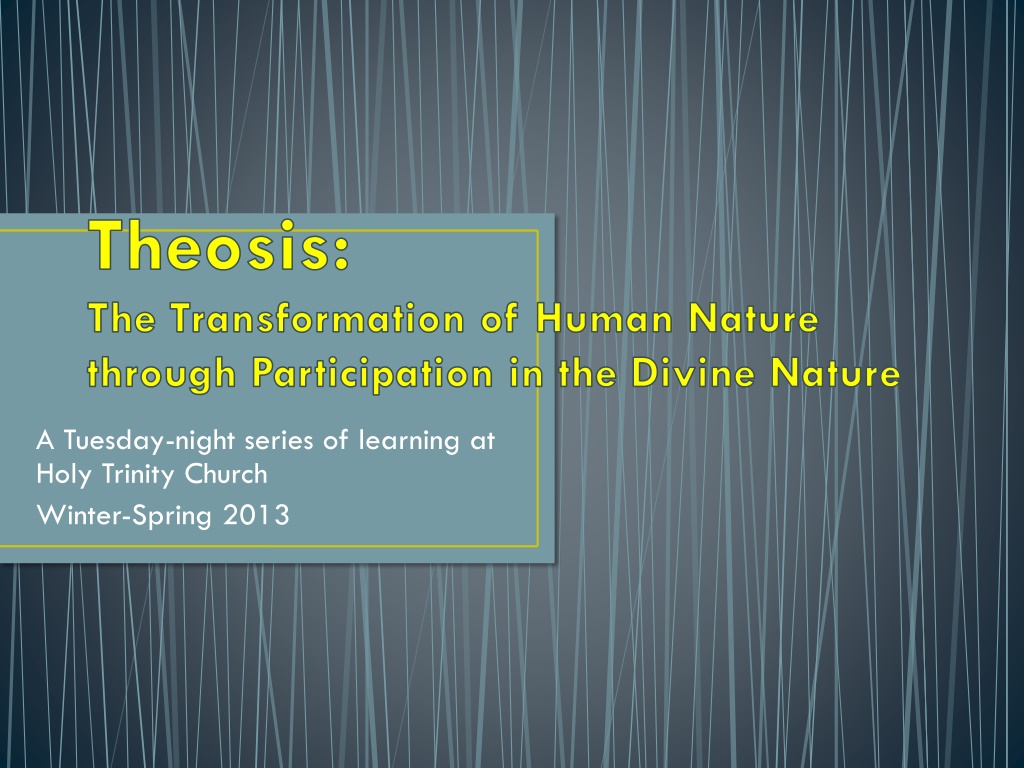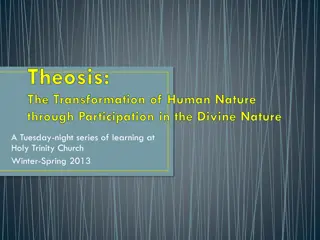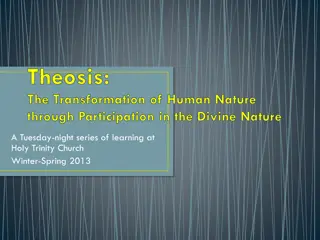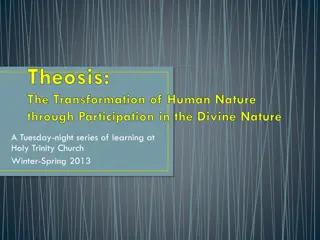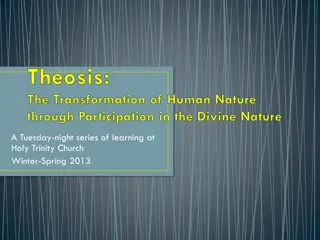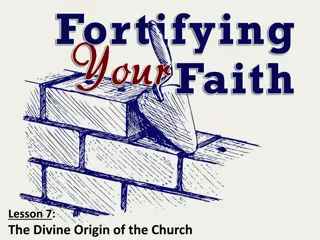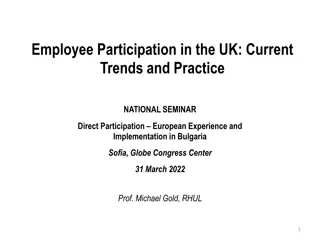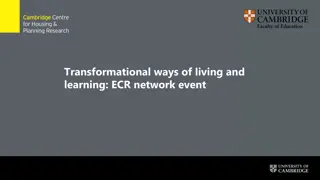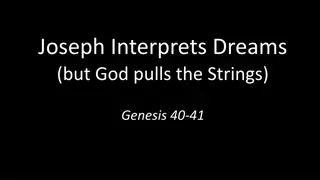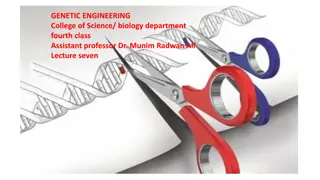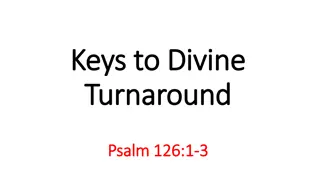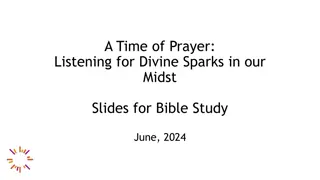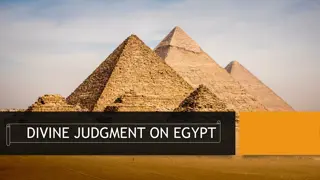Exploring Theosis: Transformation through Divine Participation
Discover the profound concept of theosis - the transformation of human nature through participation in the divine nature as explored in a Tuesday-night series at Holy Trinity Church. Delve into its origins in Christian theology, its presence in the New and Old Testaments, the development by church fathers, its expression in worship, the path to attaining theosis, and its relevance in modern times.
Uploaded on Sep 07, 2024 | 0 Views
Download Presentation

Please find below an Image/Link to download the presentation.
The content on the website is provided AS IS for your information and personal use only. It may not be sold, licensed, or shared on other websites without obtaining consent from the author. Download presentation by click this link. If you encounter any issues during the download, it is possible that the publisher has removed the file from their server.
E N D
Presentation Transcript
Theosis: The Transformation of Human Nature through Participation in the Divine Nature A Tuesday-night series of learning at Holy Trinity Church Winter-Spring 2013
Some Basic Questions Is theosis a pagan or a Christian concept? Is it found in the Old and New Testaments of the Christian Bible? How did the Fathers of the Church develop this doctrine? How does the doctrine manifest itself in the church s worship and expressions of faith? How does one attain to theosis/deification? What does it mean for us today?
A Basic Bibliography Michael J. Christensen & Jeffery A. Wittung, eds. Partakers of the Divine Nature: The History and Development of Deification in the Christian Traditions, Baker Academic 2007 Stephen Finlan & Vladimir Kharlamov, eds. Theosis: Deification in Christian Theology, Princeton, 2006 Vladimir Kharlamov, ed. Theosis: Deification in Christian Theology, Vol. Two, Princeton, 2011 Norman Russell, Fellow Workers with God: Orthodox Thinking on Theosis, St. Vladimir s Press, 2009 Norman Russell, The Doctrine of Deification in the Greek Patristic Tradition, Oxford 2004 Panayiotis Nellas, Deification in Christ: Orthodox Perspectives on the Nature of the Human Person, St. Vladimir s Press, 1987 (translation of )
A Basic Bibliography, continued Michael J. Gorman, Inhabiting the Cruciform God: Kenosis, Justification, and Theosis in Paul s Narrative Soteriology, Eerdmans 2009 Paul M. Collins, Partaking in Divine Nature: Deification and Communion, T & T Clark, 2010 Daniel E. Wilson, Deification and the Rule of Faith: The Communication of the Gospel in Hellenistic Culture, CrossBooks, 2010 Vladimir Kharlamov, The Beauty of the Unity and the Harmony of the Whole: The Concept of Theosis in the Theology of Pseudo-Dionysius the Areopagite, Wipf and Stock, 2009 William Riordan, Divine Light: The Theology of Denys the Areopagite, Ignatius, 2008 Fran ois Brune, Pour que l homme devienne Dieu, Editions Dangles, 1992
The Fathers speak on theosis The Son of God became what we are in order to make us what he is himself. Irenaeus, Against Heresies 5 The Word of God became man so that you too may learn from a man how it is even possible for a man to become a god. Clement of Alexandria, Exhortation to the Greeks 1.8.4 God became man so that man could become God. Athanasius, On the Incarnation 54
The Fathers speak on theosis He gave us divinity, we gave him humanity. Ephrem of Syria, Hymns on Faith 5.7 Let us become as Christ is, since Christ became as we are; let us become gods for his sake, since he became man for our sake. Gregory of Nazianzus, Oration 1.5 God and man are paradigms of one another, that as much as God is humanized to man through love for mankind, so much has man been able to deify himself to God through love. Maximus the Confessor, Ambigua 10
When a sunbeam falls on a transparent substance, the substance itself becomes brilliant, and radiates light from itself. So too Spirit-bearing souls, illumined by Him, finally become spiritual themselves, and their grace is sent forth to others. From this comes knowledge of the future, understanding of mysteries, apprehension of hidden things, distribution of wonderful gifts, heavenly citizenship, a place in the choir of angels, endless joy in the presence of God, becoming like God, and, the highest of all desires, becoming God. BASIL THE GREAT (330-79), On the Holy Spirit 9.23 (emphasis added)
Biblical Foundations Genesis 1:26-27 Then God said, Let us make man ( adam) in our image, after our likeness So God created man in his own image, in the image of God he created him; male and female he created them. Genesis 3:5 But the serpent said to the woman, You will not die. For God knows that when you eat of it your eyes will be opened, and you will be like God (or gods, elohim), knowing (or, knowers of) good and evil.
Man received the honor of Gods image in his first creation, whereas the perfection of God s likeness was reserved for him at the consummation. ORIGEN (185-254), On First Principles 3.6.1 Though created in state of innocence and did not know good and evil, infant humanity had the natural capacity to grow into full maturity in God. You shall be like God, though spoken by the serpent, was indeed the promise of God but to be actualized through obedience, not disobedience. The serpent offered a shortcut. IRENAEUS (c. 135-202), Against Heresies 4.38
Biblical Foundations Psalm 82:1, 6-7 God has taken his place in the divine council; in the midst of the gods ( elohim) he holds judgment I say, You are gods, sons of the Most High, all of you; nevertheless, you shall die like men, and fall like any prince. John 10:34-35 Jesus answered them, Is it not written in your law, I said, you are gods ( ) ? If he called them gods to whom the word of God came Matthew 5:48 Be perfect ( ), therefore, as your heavenly Father is perfect.
You were called a catechumen, which means one into whom something is drummed from without. You heard of some hope, but you did not know what. You heard mysteries without understanding anything. You heard Scriptures without plumbing their depth. It is not drummed in, any more, but whispered. For the indwelling Spirit is fashioning your mind into mansions for God. When you hear, in the future, Scriptures concerning mysteries, you will understand things you knew nothing of. And do not esteem as if a trifle what you are receiving you are recipient of a divine title It was as foreseeing that a divine title would come to be applied to human beings that the psalmist, speaking in the person of God, said, I have said, you are gods and are all the children of the most High. You have entered the contest; run your course steadfastly. CYRIL OF JERUSALEM (315-86), Procatachesis 6
From the one true God, certain ones, in order that they might be gods, did not have the name by nature but received it by the gift of grace. Concerning such gods, it was Moses to whom that one true God said, See, I have made you like God to Pharaoh (Exodus 7:1). Of such people are also those to whom it is said, I said, You are gods, children of the most High, all of you. Therefore, these gods received that grace to be gods so that they might become the children of God. The Evangelist says that to those who did accept him, he gave power to become the children of God, to those who believe in his name, who were born, not by natural generation, or by human choice or by a man s decision, but of God. Likewise, to them it is said, I said, You are gods, children of the most High, all of you. FULGENTIUS OF RUSPE (467-532), Letter 12.9
Biblical Foundations John 10:34-35 Jesus answered them, Is it not written in your law, I said, you are gods ( ) ? If he called them gods to whom the word of God came do you say of him whom the Father consecrated and sent into the world, You are blaspheming, because I said, I am the Son of God ? If I am not doing the works of my Father, then do not believe me; but if I do them, even though you do not believe me, believe the works, that you may know and understand that the Father is in me and I am in the Father.
Christ was not man [first], and then became God. Rather, he was [first] God, and then he became man, and that to deify us. When he became man, he was called Son and God, but before he became man, God had called the ancient people sons. In fact, he made Moses a god to Pharaoh, and Scripture says of many, God stands in the congregation of gods. Since this is so, it is plain that he is called Son and God later than they are. How then are all things through him, and how is he before everything? Or, how is he firstborn of the whole creation if he has others before him who are called sons and gods? And how is it that those first partakers do not partake of the Word? ATHANASIUS (295-373), Discourses Against the Arians 1.11.39
If the word of God came to people, that they might be called gods, how can the very Word of God, who is with God, be other than God? If by the word of God people become gods, if by participation they become gods, can he in whom they participate not be God? If lights that are lit are gods, is the light that enlightens not God? If through being warmed in a way by saving fire they are constituted gods, is he who gives them the warmth other than God? You approach the light and are enlightened and numbered among the children of God. AUGUSTINE (354-430), Tractates On the Gospel of John 48.9
The Son does not say, The Father is in me, and I in him, in the sense in which we say it. For if our thinking is in line with him, then we are in God. And if we live the way he wants us to, then God is in us. Believers, by participating in his grace and being illuminated by him, are said to be in him and he in us. But this is not how it is with the only begotten Son. He is in the Father, and the Father is in him as one who is equal is in him whose equal he is. In short, we can sometimes say, We are in God, and God is in us, but can we say I and God are one? You are in God because God contains you. God is in you because you have become the temple of God. Recognize the prerogative of the Lord and the privilege of the servant. The prerogative of the Lord is equality with the Father; the privilege of the servant is fellowship with the Savior. AUGUSTINE, Tractates On the Gospel of John 48.10
The law gives the name of gods to those who are confessedly mortals. And so, if other people may use this name without blasphemy, there can obviously be no blasphemy in its use by the man whom the Father has sanctified. Also, note here that throughout this argument he calls himself man, for the Son of God is also Son of man. He excels above the rest who, nonetheless, are guilty of no irreverence in styling themselves gods And so, the accusation of blasphemy against him in making himself God falls to the ground. For the Word of God has conferred this name on many people; and he who was sanctified and sent by the Father did no more than proclaim himself the Son of God. HILARY OF POITIERS (315-367), On the Holy Trinity 7.24
So uniting with your body, I share in your nature, and I truly take as mine what is yours, uniting with your divinity, and thus becoming an heir, superior in my body to those who have no body. I am made a son of God, as you have said, not to the angels, but to us, calling us gods. You are gods and are all sons of the Most High. Glory be to your kindness and to the plan (oikonomia) by which you became human, you who by nature are God and you made me god, a mortal by my nature, god by adoption and by your grace, through your Spirit, bringing together as god a unity of opposites. SYMEON THE NEW THEOLOGIAN (949-1022), Hymns of Divine Love 7.30-42
Biblical Foundations Context! Psalm 82:1-4, 6-8 God has taken his place in the divine council; in the midst of the gods ( elohim) he holds judgment: How long will you judge unjustly and show partiality to the wicked? Give justice to the weak and the fatherless; maintain the right of the afflicted and the destitute. Rescue the weak and the needy; deliver them from the hand of the wicked. I say, You are gods, sons of the Most High, all of you; nevertheless, you shall die like men, and fall like any prince. Arise, O God, judge the earth; for to you belong all the nations!
In Psalm 82, the Lord God presides over the great assembly of gods and mortals. What God says to mortals is meant to shock: You are gods, sons of the Most High. God is calling humans, created in God s image and likeness, to act with justice, as God would act: to defend the cause of the weak and needy, and deliver them from the hand of the wicked. This aspect seems to have received little attention by ancient and modern writers on theosis. The danger always exists that theosis becomes a personal attainment, in isolation, through prayer and ascetical effort.
Biblical Foundations 2 Corinthians 3:18 And we all, with uncovered face, beholding the glory of the Lord as (though reflected) in a mirror, are being transformed into the same image from one degree of glory to another. .
Therefore, I do not think it is a fearful thing (I mean that our nature is changeable). The Logos shows that it would be a disadvantage for us not to be able to make a change for the better, as a kind of wing of flight to greater things. Therefore, let no one be grieved if he sees in his nature a penchant for change. Changing in everything for the better, let him exchange glory for glory, becoming greater through daily increase, ever perfecting himself and never arriving too quickly at the limit of perfection. For this is truly perfection: never to stop growing toward what is better and never placing any limit on perfection. GREGORY OF NYSSA (335-94), On Perfection
Biblical Foundations 1 John 3:2-3 Beloved, we are God s children now; it does not yet appear what we shall be, but we know that when he appears we shall be like him, for we shall see him as he is. And every one who thus hopes in him purifies himself as he is pure. , , . , , .
John says that he does not know what form the coming deification through the virtues of faith will take for those who are children of God here on earth now. The independently existing nature of the good things to come has not yet been revealed in detail. Here on earth we walk by faith, not by sight. Paul on the other hand says that through revelation we have received the divine promise concerning the good things which are to come but does not claim to know what these are in any detail. Thus he says quite clearly that he examines himself and pursues the higher calling as far as he understands what it is. MAXIMUS THE CONFESSOR (580-662), Catena
Biblical Foundations 2 Peter 1:3-4 His divine power has given us everything needed for life and godliness, through the knowledge of him who called us by his own glory and goodness. Thus he has given us, through these things, his precious and very great promises, so that through them you may escape from the corruption that is in the world because of lust, and may become participants of the divine nature ( ).
What is the fellowship of the Holy Spirit? Peter describes this by calling it sharing in the divine nature. ORIGEN, Sermons on Leviticus 4.4 God became the bearer of flesh in order that man might become bearer of the Spirit. ATHANASIUS, On the Incarnation 8 When Christ s body and blood become the tissue of our members, we become Christ-bearers and partakers of the divine nature, as the blessed Peter said. CYRIL OF JERUSALEM, Mystagogical Lectures 4.3
The fact is that God made humankind a partaker of the divine nature, as we read in the second epistle of Peter. He granted us a relationship with himself, and we have a rational nature which makes us able to seek what is divine, which is not far from each one of us, in whom we live and are and move. AMBROSE OF MILAN (333-97), Letters to Priests 49 Just as God stepped out of his nature to become a partaker of our humanity, so we are called to step out of our nature to become partakers of his divinity. HILARY OF ARLES (401-49), Introductory Commentary on 2 Peter
The broader context of 2 Peter 1:4 His divine power has given us everything needed for life and godliness, through the knowledge of him who called us by his own glory and goodness. Thus he has given us, through these things, his precious and very great promises, so that through them you may become participants of the divine nature. For this very reason, you must make every effort to support your faith with goodness, and goodness with knowledge, and knowledge with self-control, and self-control with endurance, and endurance with godliness, and godliness with mutual affection, and mutual affection with love. For if these things are yours and are increasing among you, they keep you from being ineffective and unfruitful in the knowledge of our Lord Jesus Christ Therefore, be all the more eager to confirm your call and election.
Words of Caution What deification is not: When the Church calls us to pursue godliness, to be more like God, this does not mean that human beings become divine. We do not become like God in His nature. That would not only be heresy, it would be impossible. For we are human, always have been human, and always will be human. We cannot take on the nature of God. The Orthodox Study Bible
